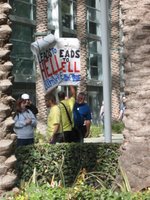For those of for whom the
And for those of you who for various reasons might feel inclined to find affinity with this stereo type of the
“Here’s the urban legend: The emerging movement talks like Lutherans – which means they cuss and use naughty words; they evangelize and theologize like the Reformed – which means, in the first case, they don’t do much of it, and in the second, they do it all the time; they confess their faith like the mainliners – which means they say things publicly they don’t really believe in their hearts; they drink like Episcopalians – which means – to steal some words from Mark Twain – they are teetotalers sometimes – when it is judicious to be one; they worship like the charismatics – which means with each part of the body, some parts of which have tattoos; they vote liberal – which means they all move to Massachusetts come election time; they deny truth – which means Derrida is carried in their backpacks.”
Scot McKnight has written a wonderfully articulate paper on the essentials of what the movement is about. This paper was presented at Westminster Theological Seminary. His challenge to all of us is to allow the movement to define itself.
“In order to define this movement, there is a correct method to follow.
Which is where I want to go now: to define a movement we must, as a courtesy, let it say what it is or describe it until the other side says “Yes, now you’ve got it.” To define a movement, we must let the movement have the first word.”
So read it. In the first part of the paper McKnight exposes the conclusions of D.A. Carson and other critics for what they are - speculative projections of doom. As I read McKnight's paper I was struck by the idea that in many instances it seems that Evangelicalism has had to prop up the image of a formidable opponent as a threat to evangelical orthodoxy in order to defend and perpetuate its own schema.
I follow McKnight’s blog: Jesus Creed as well.
Ht: Mike King







 As most of you have heard Ted Haggard has finally confessed to sexual misconduct in realtionship with a male prostitute. I read the
As most of you have heard Ted Haggard has finally confessed to sexual misconduct in realtionship with a male prostitute. I read the 